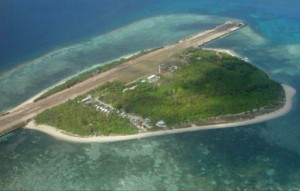Justice Carpio pessimistic on PH case vs China but…

Senior Associate Justice Antonio Carpio, speaking before the law graduates at the Pamantasan ng Lungsod ng Maynila, said that even if the Philippines wins its case, there is difficulty in enforcing such ruling citing a “black hole” in international rule of law “where there is a law but there is no justice.”
He said if Unclos rules against the Philippines, China has the naval might to enforce the decision on its own.
But if the decision is adverse to China, it has already stated that it will not be bound by such an adverse decision.
“The Philippines does not have the naval might to compel China to comply with any decision of the arbitral tribunal. So, what can the Philippines do?” he asked.
Carpio explained that under the United Nations Charter, the winning state in a decision by the International Court of Justice can ask the Security Council to enforce the ICJ ruling. But Unclos does not provide for any enforcement mechanism for decisions of the International Tribunal on the Law of the Sea (Itlos) or the arbitral tribunal under Unclos.
Article continues after this advertisementEven for ICJ rulings, Carpio said the Security Council can only act if none of the five permanent members will oppose the implementation of the ICJ ruling, as each of the five permanent members wields veto power.
Article continues after this advertisement“China is a permanent member of the Security Council and will naturally veto any enforcement measure against itself,” he said.
“Decision of Itlos and of Unclos arbitral tribunals, may declare that there is an international law giving rise to a right, and a correlative duty, between states that are parties to a maritime dispute. There is, however, no way of enforcing that right, or exacting compliance with that duty, between the parties to the dispute. This is where the Rule of Law in the international sphere falls into a black hole – a gap in the Rule of Law where there is a law but there is no justice,” Carpio said.
He told the graduating students that appealing to world opinion is the country’s only recourse.
“As life-long students of the law with an abiding faith in the Rule of Law, it is your mission from now on to help shape world opinion that a nation should follow the Rule of law if it wants to be accepted as a member and leader of the community of civilized nations,” he said.
“With a favorable decision from the arbitral tribunal and world opinion also in our favor, time will be on the side of the Philippines…As life-long students of the law, your mission is to help protect, through advocacy of the Rule of Law, our nation’s maritime entitlements in the West Philippine Sea from encroachment by other countries. Our nation counts on you,” Carpio said.